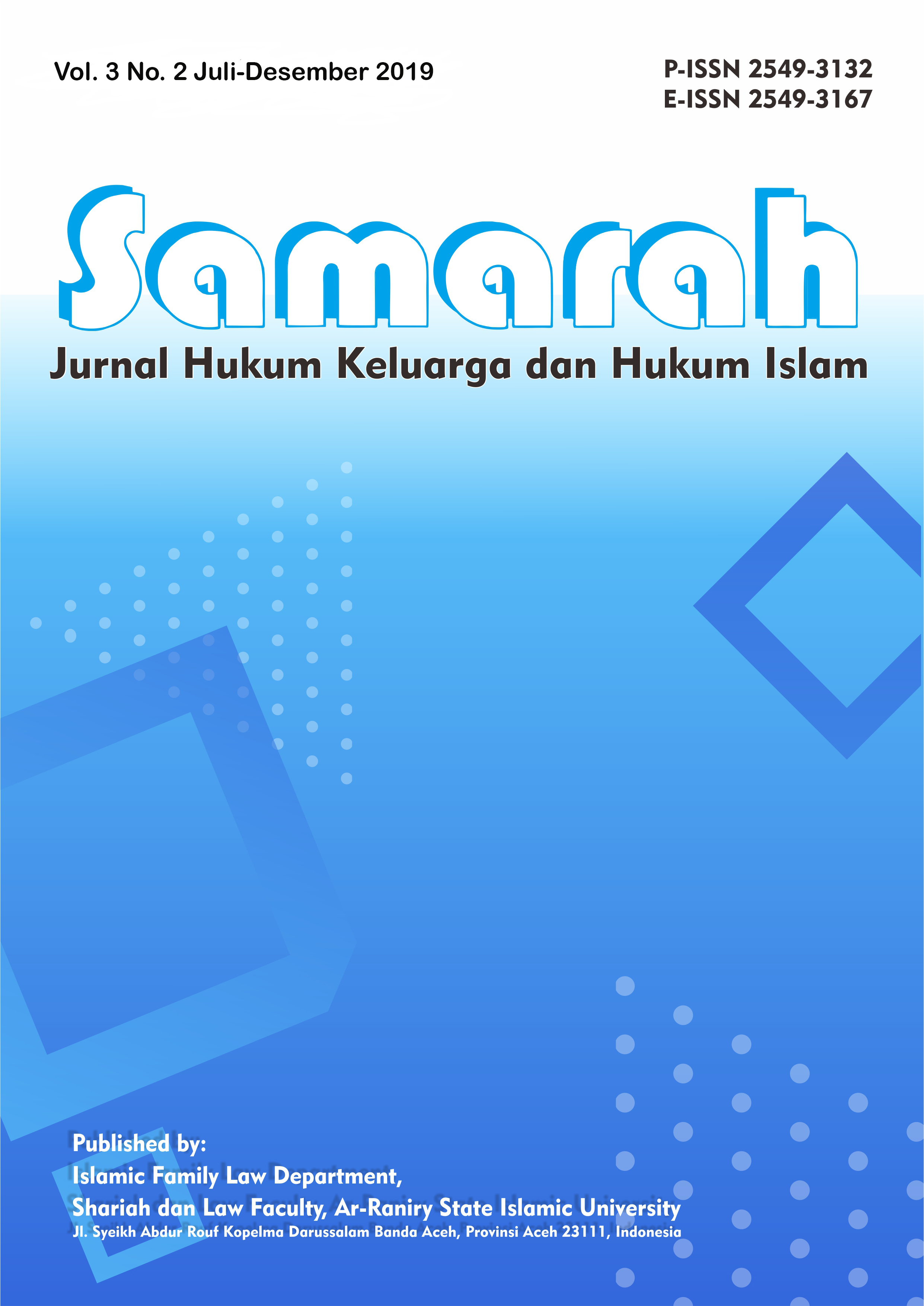Teori ‘Asabiyyah Ibn Khaldun dalam Perspektif Hukum Islam (Theory of 'Asabiyyah Ibn Khaldun in Islamic Law Perspective)
DOI:
https://doi.org/10.22373/sjhk.v3i2.5277Keywords:
The theory of ' Asabiyyah, Ibn Khaldun, Islamic lawAbstract
The theory of 'Asabiyyah (Solidarity of groups, fanaticism of tribes or nepotism) is the fruit of the Ibn Khaldun think. The birth of the theory of 'Asabiyyah is not separated from his observation of the condition of Muslims when it is in the interfaith and seize power by relying on the solidarity of Groups, group. This article is about to examine the theory of 'asabiyyah Ibn khaldun. This article is reviewed with a historical and normative approach. The results showed that in order to practice this 'Asabiyyah theory does not lead to evil and negative, according to Ibn Khaldun's opinion, it is the only solution to control and control the operation of the group. Religion is instrumental in lowering the tension of this asabiyyah practice. Although Ibn Khaldun has explained 'Asabiyyah (Solidarity Group, fanaticism group) part of Sunnatullah that cannot be eliminated from human life, we should also see from the Islamic eyewear in this case Islamic law on the practice of ' Asabiyyah (Solidarity Group). In the view of Islamic law, the practice of 'Asabiyyah (solidarity Group) is not allowed to be banned by reason of violating the purpose of establishing Islamic law itself. The purpose of established Islamic law is to create the benefit of mankind. While the practice of solidarity group, Fanatime tribe, and nepotism gave misery, the distress, hostility and destruction of the joints of human life, both in the world and in the hereafter.
References
‘Abdurrahman Ibn Khaldun. Muqaddimah al-‘Allamah Ibn Khaldun. Beirut: Dar al-Fikr, 1998.
-------, Filsafat Islam tentang Sejarah: Pilihan dari Muqaddimah, terj. Charles Issawi disalin, A. Mukti Ali, cet. II. Yogyakarta: Tintamas, 1976.
--------. Tarikh Ibn Khaldun: al-Musamma: Kitab al- ‘ Ibar wa Diwan al- Mubtada’ wa al-Khabar fi Ayyam al-‘Arab wa al-Barbar wa man ‘Asaruhum min Dhawi al-Sultan al- Akbar. jild. I. cet. I. Beirut: Dar al- Kutub al-‘Ilmiyyah, 1992.
A.Rahman Zainuddin, Kekuasaan dan Negara: pemikiran politik Ibn Khaldun, Jakarta: Gramedia Pustaka utama, 1992.
Abdul Wahhab Khallaf, Kaidah-kaidah Hukum Islam, Cet. IV; Jakarta: Raja Grafindo Persada, 1994.
Ernest Gellner, Muslim Society, Melbourn: Cambridge University Press, 1981.
Faturrahman Djamil, et.al, Menvingkap Korupsi, Kolusi dan Nepotisme di Indonesia, Pengantar M. Amien Rais, Cet. I, Yogyakarta: Aditya Media, 1999.
Ibn Khaldun, Filsafat Islam tentang Sejarah: Pilihan dari Muqaddimah, terj. Charles Issawi, Filsafat Islam tentang Sejarah, Jakarta: Tinta mas, 1976.
Ibn Khaldun, The Muqaddimah, Translated fron Arabic by Fronz Rosenthal. 3 Volumes, New Yok: Panthean Books, 1958.
JW. Schoorl, Modernisasi, Pengantar Sosiologi Pembangunan Negara-negara Sedang Berkembang, Penerbit Gramedia, Jakarta, Tahun 1980.
M. Quraish Shihab, Wawasan Al-Qur’an: Tafsir, Maudhu’I atas perbagai Persoalan Umat, Bandung: Mizan, 1996.
M.M. Rabi, The political Theory of Ibn Khaldun Leiden: EJ. Brill, 1967.
Misri A. Muchsin, Filsafat Sejarah dalam Islam, Yogyakarta: Ar-Ruzz Press, 2002.
Munawaar Fuad Noer, Islam dan Gerakan Moral anti Korupsi, (Ed) H. Ahmad Sya'i Mufid, Cet. I, Jakarta: CV. Zikrur- Hakim, 1997.
Rahman Zainuddin, A. Kekuasaan dan Negara: Pemikiran Politik Ibn Khaldun. Jakarta: Gramedia Pustaka Utama, 1992.
Suyuthi Pulungan, Fiqh Siyasah: ajaran, sejarah dan pemikiran, Jakarta: RajaGrafindo Persada, 1997.
M.M. Sharif (ed), A. History MuslimPhilosophy, Vol. 2 Wiesbaden: Otto Harrosowits, 1966.

Downloads
Published
Issue
Section
License
Authors who publish in Samarah: Jurnal Hukum Keluarga dan Hukum Islam agree to the following terms:
- Authors retain copyright and grant the journal right of first publication with the work simultaneously licensed Attribution-ShareAlike 4.0 International (CC BY-SA 4.0) that allows others to share the work with an acknowledgment of the work's authorship and initial publication in this journal.
- Authors are able to enter into separate, additional contractual arrangements for the non-exclusive distribution of the journal's published version of the work (e.g., post it to an institutional repository or publish it in a book), with an acknowledgment of its initial publication in this journal.
- Authors are permitted and encouraged to post their work online (e.g., in institutional repositories or on their website) prior to and during the submission process, as it can lead to productive exchanges, as well as earlier and greater citation of published work. (See The Effect of Open Acces)









